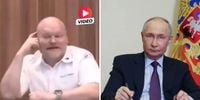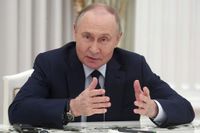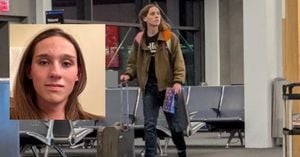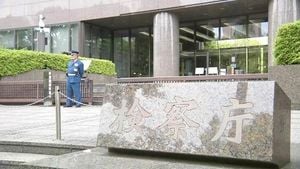An unusual dialogue from Russian state television has recently made headlines: German star chef Maksim Zitnikov, who has established a prominent reputation in the Ruhr region, has expressed his desire to apply for Russian citizenship directly to President Vladimir Putin. The chef, originally from Uzbekistan, emigrated to Russia in 2023 and has since been living in Dobrograd, a newly built city located about two hours east of Moscow.
During a video conference with Putin, Zitnikov took the opportunity to make his request known, speaking partly in German. "Wladimir Wladimirowitsch, darf ich Sie um etwas bitten? Ich weiß, dass Sie mich verstehen," Zitnikov stated, which translates to, "Mr. Vladimir, may I ask you for something? I know that you understand me." This direct approach garnered attention, particularly given the high-profile nature of the conversation.
The video conference was primarily focused on discussing infrastructure development and economic issues, yet Zitnikov's personal plea took center stage. He expressed his wish to relinquish his German citizenship in favor of a Russian passport, citing bureaucratic challenges in navigating the necessary paperwork. "Ich würde gerne die deutsche Staatsangehörigkeit abgeben und die russische bekommen," he articulated, meaning, "I would like to give up my German citizenship and obtain the Russian one."
Putin, who is fluent in German due to his time as a KGB officer stationed in East Germany from 1985 to 1989, responded in kind. "Wir bleiben in Kontakt und lösen das Problem," he assured Zitnikov, which translates to, "We will stay in touch and solve the problem." This exchange demonstrated not only the chef's determination but also Putin's willingness to engage directly with a citizen's request.
Zitnikov's candidness about his struggles with the bureaucratic process resonated during the conversation. He lamented the difficulties he faced, saying, "Die machen alles kaputt," which translates to, "They are ruining everything," though he did not specify who he was referring to. This comment elicited a chuckle from Putin, highlighting a moment of levity amidst the serious nature of the discussion.
As the conversation progressed, it became clear that Zitnikov's request was not merely a personal endeavor but also a reflection of the broader relationship between Russia and its expatriates. The chef's move to Russia was motivated by a desire to contribute to the culinary landscape of his new home, and he has been actively involved in promoting Russian cuisine.
Putin's engagement in the dialogue is particularly noteworthy, given his history of learning German during his school years in Saint Petersburg and his extensive experience in East Germany. His fluency has often been a point of interest, allowing him to connect with German-speaking audiences and leaders. The president's willingness to communicate in German during the video call further emphasized the importance of the moment for both him and Zitnikov.
The exchange also raises questions about the complexities of citizenship in a globalized world. For many, the desire to switch national identities is often tied to personal aspirations, economic opportunities, and a sense of belonging. Zitnikov's case exemplifies this, as he seeks to fully integrate into Russian society while maintaining his culinary roots.
In the culinary world, the significance of nationality cannot be understated. Chefs like Zitnikov often serve as cultural ambassadors, bringing their unique backgrounds and experiences to the table. His journey from Uzbekistan to Germany and now to Russia reflects a tapestry of influences that enrich the culinary scene in his new country.
As the conversation concluded, the chef's hopes rested on the president's promise to assist him in navigating the bureaucratic hurdles. The public's reaction to this unusual request will likely be mixed, with some viewing it as a bold move while others may question the implications of such a high-profile plea.
In a time when discussions about citizenship and national identity are increasingly relevant, Zitnikov's story serves as a reminder of the personal dimensions behind these complex issues. His direct appeal to Putin not only highlights the challenges faced by many expatriates but also underscores the potential for individual stories to resonate on a national level.
As Russian media continues to cover this unfolding narrative, it remains to be seen how Zitnikov's request will be received by the broader public and whether it will prompt discussions about citizenship reform in Russia. The chef's journey is a testament to the ever-evolving landscape of identity and belonging in today's world.
In the end, Maksim Zitnikov's bold request to President Putin has not only captured the attention of the media but also sparked conversations about the nature of citizenship and the personal journeys that accompany such decisions. As he awaits a response, the culinary community and the public alike will be watching closely to see how this unique story unfolds.





